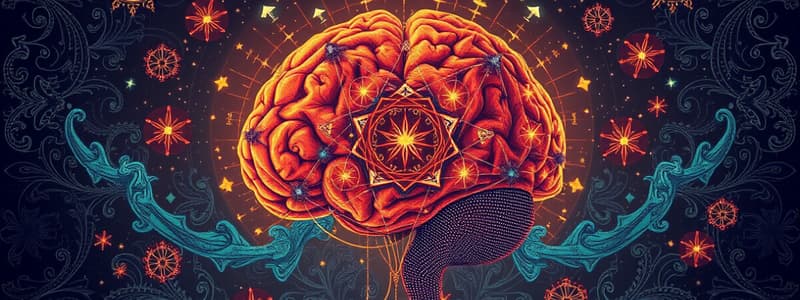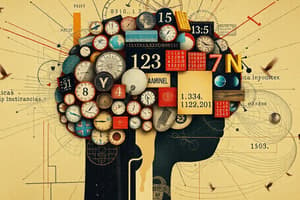Podcast
Questions and Answers
TCM has been established for a period of over 30 years.
TCM has been established for a period of over 30 years.
False (B)
Subscribers to TCM receive notifications of new issues through eTOC alerts.
Subscribers to TCM receive notifications of new issues through eTOC alerts.
True (A)
The section 'Math by the Month' in TCM includes annual activity themes.
The section 'Math by the Month' in TCM includes annual activity themes.
False (B)
TCM places an emphasis on the integration of mathematics with other disciplines.
TCM places an emphasis on the integration of mathematics with other disciplines.
TCM offers only articles based on traditional teaching methods.
TCM offers only articles based on traditional teaching methods.
Researchers in mathematics education and psychology focus solely on cognitive mechanisms related to mathematical learning.
Researchers in mathematics education and psychology focus solely on cognitive mechanisms related to mathematical learning.
Jean Piaget's work has significantly influenced theories about children's learning of numbers.
Jean Piaget's work has significantly influenced theories about children's learning of numbers.
Children's ability to understand numbers is solely dependent on their cognitive maturity.
Children's ability to understand numbers is solely dependent on their cognitive maturity.
The International Group for the Psychology of Mathematics Education promotes the integration of psychology and mathematics education perspectives.
The International Group for the Psychology of Mathematics Education promotes the integration of psychology and mathematics education perspectives.
Mathematics education cannot benefit from psychological theories related to memory and attention.
Mathematics education cannot benefit from psychological theories related to memory and attention.
TCM focuses exclusively on traditional methods of teaching mathematics.
TCM focuses exclusively on traditional methods of teaching mathematics.
Articles in TCM are designed to engage students in meaningful mathematical experiences.
Articles in TCM are designed to engage students in meaningful mathematical experiences.
The collaboration between psychology and mathematics education is a recent development.
The collaboration between psychology and mathematics education is a recent development.
Flashcards are hidden until you start studying
Study Notes
Understanding How Learning Works
- Researchers in mathematics education and psychology focus on understanding the learning process.
- Mathematics education researchers investigate cognitive mechanisms to enhance classroom practices.
- Psychologists study general cognitive mechanisms and may focus on learning within specific domains like mathematics.
Historical Influence: Piaget and Learning of Numbers
- Psychology has strongly impacted theories about children's numerical learning.
- Jean Piaget's research contributed to how developmental stages affect understanding of numbers.
- The belief that cognitive maturation limits children's numerical comprehension has shaped teaching methods and curriculum design.
Early Intuitive Sense for Numerosity
- Recent findings suggest children's numerical understanding is not solely dependent on cognitive maturity.
- Children possess an early intuitive grasp of numerosity and fundamental numerical operations.
- The human brain is equipped to process numerical information from a young age.
Integration of Perspectives
- There has been a long-standing integration of perspectives between psychology and mathematics education.
- Organizations like the International Group for the Psychology of Mathematics Education promote collaboration among researchers.
- Analyzing both cognitive mechanisms and specific mathematical topics benefits educational research.
Benefiting from Psychological Theories
- Integrating psychological theories can enhance mathematics education practices.
- Insights into memory, attention, and motivation help educators create more effective math instruction.
- Psychological theories influence instructional strategies, assessment, and classroom management.
Teaching Children Mathematics (TCM) - Focus and Purpose
- TCM is a journal by the National Council of Teachers of Mathematics (NCTM) focusing on intuitive and exploratory math teaching.
- The journal emphasizes using informal reasoning to develop students' conceptual foundations for mathematics.
Content and Approach
- TCM provides practical ideas, engaging classroom activities, and research-informed insights for educators.
- Articles encourage meaningful mathematical experiences and exploration of innovative teaching methods to accommodate diverse learners.
Award-Winning Articles
- TCM has been recognized with numerous awards over its 25-year history, including accolades from the Society of National Association Publications.
- The journal consistently publishes high-quality content appealing to educators.
Online Access and Resources
- TCM offers online availability with an ISSN of 2327-0780.
- Subscribers receive electronic table of content (eTOC) alerts for new issues.
Math by the Month
- TCM features "Math by the Month," a section with collections of short, theme-based activities.
- This section includes inquiry-based and problem-solving activities for grade bands K–2, 3–4, and 5–6.
Integration of Mathematics and Other Disciplines
- TCM highlights the importance of connecting mathematics with other subjects like science, technology, engineering, and art.
- Articles explore interdisciplinary approaches to enhance understanding and relevance in math education.
Studying That Suits You
Use AI to generate personalized quizzes and flashcards to suit your learning preferences.




